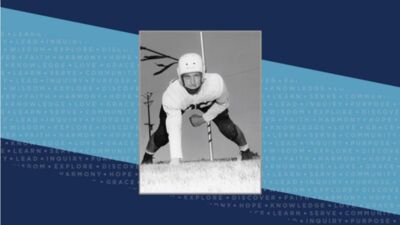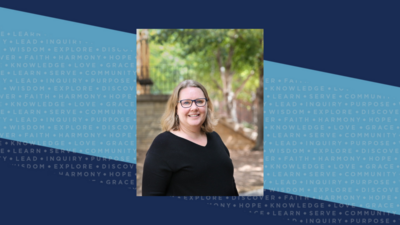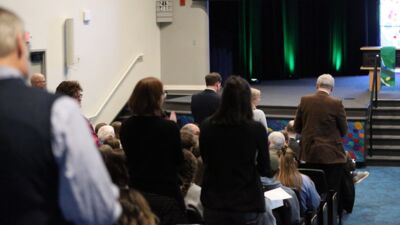From Jefferson, Iowa, High School to CTC: The Story of Dr. Larry Matthews

Dr. Larry Matthews ’57, professor of mathematics at Concordia Teachers College from 1968 to his retirement in 2008, has a fascinating family history and path to his enrollment at Concordia Nebraska in 1953.
Larry’s great-grandmother Dorothea Campbell was one of eight children. She was a member of the Lakota Native American tribe, following the tradition of that culture that children would belong to the tribe of the mother. She married a Mormon, Henry Mathews.
Larry’s grandfather, Wilber Mathews, son of Dorothea and Henry, married Anna Spence, an immigrant from Glasgow, Scotland. Wilber and Anna lived in the Council Bluffs, Iowa, area and had three children, one of them being Harry, Larry’s father. Larry’s grandfather, Wilber, enlisted in the armed forces during World War I and served as a medic in combat areas. During battle, he was gassed and suffered from long-term lung problems. Eventually Wilber moved to Arizona for health reasons. Larry’s grandmother divorced her husband and remarried a widower, Frank Bowers. Frank raised the three children, including Larry’s father, Harry.
Harry Matthews (an extra “t” was added to the last name) farmed near Jefferson, Iowa. He married Florence Nahnsen, and they had three children prior to World War II. Larry was the oldest. After the U.S. entered World War II in 1941, Larry’s dad tried to enlist in the army, but was rejected because he had flat feet. Later in the war he was accepted into the army. As a young man he was known as a sharpshooter; later he served as a sniper during the Battle of the Bulge in late 1944. Harry was wounded during that battle. When he returned from the service, he operated an auto body repair shop in Jefferson, then worked on building drains for farm ponds.
Harry and Florence had two additional children. When Larry was a high school junior, his father disappeared because of his strong sense of belonging to the Lakota culture, the tribe of his grandmother, Dorothea. Eventually, he lived on a reservation in Arizona. He died at the young age of 53. Between his junior and senior years in high school, Larry assumed his father’s job working on pond drains. Larry’s mother supported the family by working as a cook at the local hospital.
Larry received his elementary and secondary education in Jefferson. In high school he was active in band, choir and excelled in football. The Jefferson High football team at that time had a remarkable record: holding their opponents scoreless in 15 consecutive games, including a 0-0 tie. Larry was a star linebacker and guard on that team. He was honored as Most Valuable Player on his team in his senior year. He was selected to the all-conference team, and the Omaha World Herald named him to the Southwest Iowa first team. In his free time, Larry was a pin setter at the local bowling alley.
But what to do after high school? His father did not want Larry to go to college. But an apparent “golden” opportunity presented itself when he met with Forest Evashevski, the head coach of the Iowa University Hawkeyes football team. He offered Larry one of five full-ride football scholarships available. Here was a chance to receive an essentially “free” college education at a quality university while he could continue his football career. But several concerns troubled Larry. One was the expectation for a nearly total commitment to football which he would face at Iowa if he accepted the offer. He also considered how he could best serve the Lord.
Larry decided to talk to his congregation’s pastor Walter Schultz. The pastor strongly urged Larry to attend Concordia Teachers College (CTC) in Seward, Nebraska to become a Lutheran teacher. Larry accepted that counsel and enrolled at Concordia in the fall of 1953.
But there was a major obstacle facing Larry: how to finance the costs of tuition and fees at Concordia. Concordia did not offer athletic scholarships in those days. His mother’s limited income could never cover expenses for herself and the four children still at home plus college costs. They planned to inquire at the local bank about a loan.
However, shortly after Larry’s high school graduation, he met Charley Davis, a civil engineer who was in charge of a highway paving project out of Jefferson. He had not known Davis before. Davis offered Larry a summer job on the road crew paying $1 an hour plus overtime for working a six-day week and occasionally on Sundays. After he started the job, he was offered a second job cleaning machinery. He was working about 80 hours a week. By the end of the summer, he had $1,380 in his savings account, far more than the cost of tuition and fees at Concordia: $450 for room, board and tuition, plus textbooks. Larry worked on road construction for four and a half summers. He was even able to cover the expenses at Concordia for his sister Cleo. Larry considers the offer at Iowa, the advice of his pastor and the support of Charley Davis as evidence of the role of God in his life.
During his four years at CTC, Larry played offensive guard and defensive linebacker on the football team. But he was more than a student-athlete: he sang in the A Cappella choir all his years there.
Following graduation, Larry taught at two Lutheran elementary schools and one Lutheran high school. During that time, he earned a master’s degree in mathematics. In 1968, Larry accepted a call to teach mathematics at his alma mater where he continued until his retirement. While at Concordia he earned a doctorate from the University of Nebraska-Lincoln. Larry had an outstanding tenure at the university and was known as a highly effective instructor who was committed to the success of his students. One of his former students described Larry’s skills in these words: “The way Dr. Matthews teaches you cannot NOT learn.”
In 1985 Concordia awarded him the university’s Outstanding Teaching Award. During his retirement, Larry continues to witness to God’s great love. Larry was blessed by God, and he has used those blessings to be a blessing to countless others.

About the Author
Dr. Jerry Pfabe serves as Concordia University, Nebraska’s archivist. He has worked at Concordia since 1967 in various capacities, including teacher, mentor, archivist and researcher. Take a trip through the archives with Jerry at cune.edu/archives.
Interested in more Concordia history?
Related Stories


